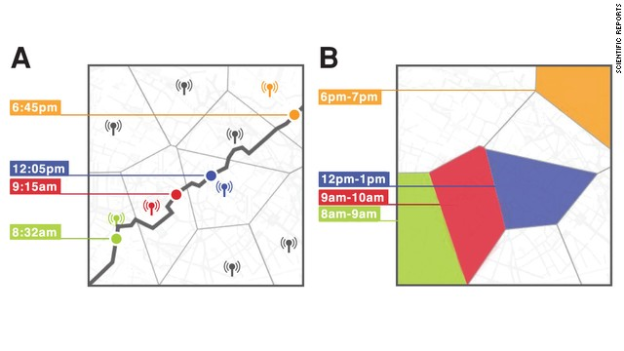 Own a cell phone? Tout it around with you no matter where you go? (Except for those dreaded days when you accidentally leave it at the office and feel completely disconnected from the world.) Then, according to a study done at MIT and reported by CNN, you are now the proud owner of a brand new type of fingerprint, so to speak.
Own a cell phone? Tout it around with you no matter where you go? (Except for those dreaded days when you accidentally leave it at the office and feel completely disconnected from the world.) Then, according to a study done at MIT and reported by CNN, you are now the proud owner of a brand new type of fingerprint, so to speak.
The study shows that, since our phones are constantly tracking our whereabouts, regardless of whether or not you’re checking in to Facebook or Foursquare, or tracking your every meal on Foodspotting, if someone really wanted to, they could use this information to figure out who you are. The places we go, when marked down on a map, result in something like a digital a fingerprint.
The study tracked the patterns of 1.5 million different mobile users over the course of 15 months. They pulled hourly reports on each user’s movement, which they were able to track using mobile carriers’ cell phone towers; 95 percent of the time, they were able to determine a person’s identity correctly.
Why hello there, Big Brother.
This information has privacy advocates extremely worried, particularly since one court has already ruled that mobile users don’t have the right to expect privacy; law enforcement has even been known to turn to mobile carriers in order to keep tabs on people.
What’s worse is that, besides law enforcement tracking people, carriers have been opening up anonymous data to various developers. Knowing where an app user is located helps them to serve up ads more accurately, particularly local ads. Now, in light of this new study, that makes things a little scarier. Sure, if we’re going to see ads in our app, best to have ones that may be relevant to what we’re looking for. But no, we don’t want to give up the right to remain completely anonymous.
All they need are four different spots that a user visits on a regular basis, and bam: the user is able to be identified with almost certain accuracy. Visit more than four spots regularly, and that accuracy becomes even more refined.
What do you think? Does this information concern you, or do you think it’s too much effort on the average person’s account to actually worry you?


